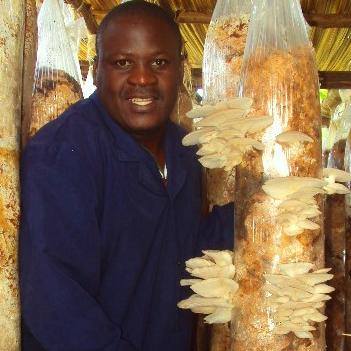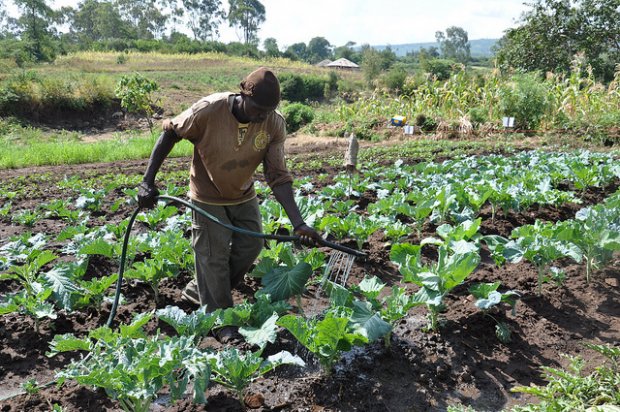
Mr. Paul Kisiangani, mushroom farmer from Kakamega besides his sprouting mushrooms. He has so far started a youth group where they produce the crop and sell collectively to they buyers. Photo courtesy.
Besides mushroom being dominated by large-scale farmers across the country, there are some smallholder farmers who have embraced the venture and are now making over Sh500, 000 annually from the venture.
Mushroom production in Kenya accounts for Sh340 millions of which 95 per cent of this comes from large-scale producers across the country such as Agridutt Limited, Rift valley mushrooms, online mushrooms, Devani and Kanchan mushrooms leaving only five per cent for small-scale producers, according to National Farmers Informational Service (NAFIS).
One of the small-scale farmers is a youth from Juja, Kiambu County who is earning Sh30,000 daily from button mushroom farming, a venture he started six years ago after quitting a teaching and electrical job which earned him a small salary of Sh500 per day.
After graduating from the Technical University of Kenya (TUK) then known as Kenya Polytechnic with a Diploma in Electronic Engineering in 2005, John Muchura, 37, got a job with an electrical installation company in Nairobi where he was involved in wiring and electrical appliances installation for the company’s clients in various places.
He started with oyster mushroom because according to him it is easy to multiply compared to button mushrooms which mutate making it difficult to produce consistent results as compared to the parent plants.
“Although oyster mushrooms do not do well in the market as compared to button mushrooms, which are easy to market and sell, I could make my own seeds with oyster mushrooms than the button mushrooms that keep changing their productivity rate if seeds are multiplied,” he said.
From one of his 15x20 metres grass-thatched mud house, he used to harvest 20 punnets which is equivalent to five kilos of oyster mushrooms per day. He sold one punnet at Sh100 translating to about Sh2000 a day. This motivated him.
RELATED ARTICLE: Youth eyes Russian market with oyster mushroom
Currently, he is harvesting over 20 kilos of button mushrooms per day which he sells at Sh600 per kilo earning him Sh12,000 per day.
In addition to this, Muchura trains over 30 farmers from various areas on button mushroom farming. These farmers also produce between 20 and 50 kilos of mushroom daily which he either buys from them or connects them with willing buyers.
The mushroom industry has a well-established private sector investment with large scale commercial farms like Agridutt Limited, Rift valley mushrooms, online mushrooms, Devani and Kanchan mushrooms. However, key exporting companies do not have out growers.
“I source from my the farmers about 50 kilos, add with my 20 kilos making it 70 kilograms or more depending on the market demand in order to sell. I am targeting more farmers who can work as a team so that we can win supply contracts with supermarkets and exporters. At least this will assure as of a more stable and consistent market for our produce.”
On a good day, he can collect up to 100 kilos of the mushrooms which can earn over Sh60,000 a day. His markets include city park market near Aga Khan Hospital in Nairobi, open air markets within Kiambu and Nairobi counties and fresh food groceries.
RELATED ARTICLE: Oyster mushroom cultivation
To help him run his five mushroom production houses, he has employed three permanent farm managers whom he has trained. Each of them earn between Sh15,000 and Sh20,000 a month.
You can reach Muchura on +254 737 746619
Victor Kyalo, also a mushroom farmer from Kathioko, Machakos County earns Sh600,000 every season by selling his mushroom directly to the market rather than via middle men who pay less by Sh50 reducing his profit by half.
“Last year when I harvested my mushrooms for the first time a broker in Nairobi promised me a good market only to offer Sh350 per kilo after transporting the produce to him,” said Victor Kyalo.
Kyalo uses water from his 60-foot dug well to keep his mushrooms growing during this dry season. He ferries his produce to Nairobi to look for a bigger market through public transportation at Sh300 per trip.
“This is the second time I am planting this type of mushrooms. I planted five litres of spawns during last year’s November to December short rains and got Sh250, 000 after selling the crops in Nairobi but I have increased to 10 litres of spawns this time round to double my harvest,” said Kyalo.
He learnt about mushroom farming from Jomo Kenyatta University of Agriculture and Technology (JKUAT) having paid to Sh10, 000 for a three day training session last year and he has since ventured in oyster mushroom farming having been encouraged by the first harvest.
He is using wheat straws as substrate and sand to grow the mushrooms in his 15x20 metres grass-thatched mud house. Since mushrooms have 80 to 90 per cent water content hence they need humid environment to thrive, sand helps Kyalo to retain water for a long time after sprinkling.
RELATED ARTICLE: There is clean money in mushrooms
“There is many uses of water here and the little water we have especially this dry season must be spent well, that is why I use sand to moderate water lose as it keeps the room wet for a long time thus I have to use less water,” he said.
Victor Kyalo can be reached on +254708486882
Paul Kisiangani while pursuing Masters of Science in Disaster Management and Sustainable Development in Masinde Muliro University in 2005, started oyster mushroom farming in a 3.5x3.5 metre room which was one of the rooms in his three bedroom house he rented in Amalemba Estate in Kakamega County.
“I did this to test what the venture could earn me. I was pleased that whatever little production then could rake me about Sh20,000 per month which I used to support my education and settle my bills as well,” said Kisiangani.
In 2008, he increased the area under mushroom production from his small room to a half an acre piece of land which he bought at Sh400,000, thanks to the Sh10,000 support he got from his wife and others from loan application.
“I have so far increased the acreage from a half an acre to an acre which accommodats seven mushroom production units measuring 4x6 metres each and I am able to harvest 10-20 kilos of the crop daily.”
RELATED ARTICLE: Water hyacinth provides good substrate for mushroom farming
He sells a kilo of fresh mushroom at Sh400 earning him between Sh4,000 and Sh8,000 per day. His markets includes fresh horticulture crops retail shops in Eldoret, Kisumu, Nairoi, Kakamega and individuals from the surrounding.
Formation of a Youth Group
Nonetheless, while hustling for a job upon graduation in 2005, Kasiangani initiated the formation of Galaxy United Youth Group in 2006, the group which has 32 members currently, all being youth mushroom farmers. Kisisngani is the director of the youth group.
“We decided to form this group to up our production in order to win more tenders by supper markets and crop retailers as we eye export markets,” said Kisiangani.
The group now owns a shop in Kakamega Town, the shop which acts as their mushroom collection centre and an office where they hold meetings among other operations.
Dry mushroom
The group has locally fabricated solar drier made from timber, green house polythene papers and shed nets to form a rack where they dry the mushrooms before grinding the mushrooms into powder and package them under Galaxy Mushroom brand for markets.
RELATED ARTICLE: Using Agricultural waste to grow mushrooms
“We decided to dry and gind into powder the mushrooms to increase their shelf-life and increase their value in the market,” said Kisiangani.
A kilo of dry and powdered mushroom fetches Sh3000 against Sh400 of fresh mushroom. Other than increasing their market value, the group has extended their supply to further markets like Mombasa, which is more than 860 kilometres from Western.
Other markets added in the list include Busia, Bungoma and Kitale where the group supply one of the leading products retail chain in western region.
During dry season the group can produce around 200 kilos of dry mushroom while in rainy season the production triples to 600 kilos a day totaling to about 1.5 tonnes a month.
One kilogramme of dry mushroom is sold at Sh3,000 while a similar fresh amount fetches Sh300. If the 1.5 tonnes are sold after drying, they rake in a gross income of Sh3.9 million while fresh one bring in Sh450,000.
However, after deducting production costs which is about Sh1.7m, the group remains with Sh4m to divide among themselves depending on the contribution of individual group member.
He can be reached on +254 722 935564
Write comment (0 Comments)




 Farmer irrigating his kales in lower Nyando, wetern Kenya. Experts argue that financial institutions have not embraced the sector due to the perceived risks involved. Photo: V. Atakos (CCAFS EA).
Farmer irrigating his kales in lower Nyando, wetern Kenya. Experts argue that financial institutions have not embraced the sector due to the perceived risks involved. Photo: V. Atakos (CCAFS EA).











